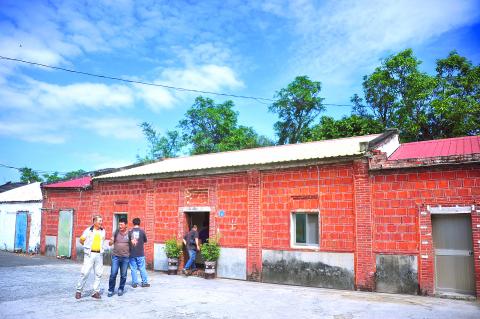The historic 130-year-old Chang mansion in Hengchun’s Beimen area was diligently maintained by a descendent of the family, Chang Wei-chi. Pingtung County Cultural Affairs Department head Wu Chin-fa and many members of the cultural heritage committee went to survey the Chang mansion and were left deeply impressed by the old well and the red tile walls of the house.
The site of the historic Chang mansion at Beimen dates from the Qing Dynasty, and includes the original Qing Dynasty site, the extension built during the Japanese colonial period and the post- retrocession extension. Chang’s descendants hope that in the future the post-retrocession part of the building will be demolished and the Qing part and the Japanese colonial era extension will be maintained. They also hope that the cultural vista of the bamboo moat and courtyard doors can be restored, creating the traditional appearance of a Hengchun style house.
Chang pointed out that portions of the site of the mansion overlap with land which is to be re-developed. The ownership of the house was complex, thus it was difficult to maintain it. He said he had the rights from the majority of owners of the house and hoped that the county would recognize it as a historic building as soon as possible.

Photo: Tsai Chong-Hsien, Liberty Times
照片:自由時報蔡宗憲
Pingtung County councilor Chang Rong-chih who is also head of the Chang clan said the Chang ancestral house is precious and the spirit displayed by young people returning to their hometown to maintain their property was moving. The older Chang generation were glad of their assistance, said Chang.
After the survey, Wu said that the well, the bamboo moat and the house itself had the beauty of an old mansion, and supported the Chang clan diligently seeking to have the house classified as a historic building. However, he said the cultural assets would still be considered in accordance with the provisions of the cultural heritage committee.
(Liberty Times, translated by Clare Lear)
一百三十多年歷史的恆春北門張家祖厝,經後代子孫張洧齊努力爭取保存,屏東縣文化處長吳錦發及多名文資委員到張家古厝會勘,對古厝的水井、斗子牆印象深刻。
歷史悠久的北門張家古厝包括清朝古厝地、日治擴建部分、光復後擴建部等時期,張家子孫希望未來將拆除光復後擴建部分,保留清朝現址與日治擴建部分,並還原竹塹與門埕之文化景觀,營造恆春傳統民宅風貌。
張洧齊指出,祖厝土地與附近土地重建部分重疊,加上古厝所有權人複雜,保存困難,目前已經取得古厝多數所有權人授權,期待縣府盡快確認為歷史建築。
身兼恆春張氏宗親會理事長的屏東縣議員張榮志說,張氏祖厝相當珍貴,返鄉年輕人保留家鄉資產的精神令人感動,張氏耆老們將鼎力協助這樁美事。
吳錦發會勘後表示,當地的水井、竹塹及建築本體都很有老厝之美,也認同張家子孫爭取為歷史建築的用心,但依規定仍須由文化資產審議委員會審議。
(自由時報記者蔡宗憲)

Nestled in the mountain region of northern Taiwan lies a small village that was once bustling due to a thriving coal industry, only to later gain fame for an entirely different reason — cats. This is Houtong Cat Village (猴硐貓村), located in Ruifang District, New Taipei City. Traditional Coal Mining and Village Transformation Houtong was originally known as “Monkey Cave” (houtong, 猴洞), a name derived from the wild monkeys that once inhabited caves in the surrounding hills. During the Japanese colonial period in the early 20th century, rich coal deposits were discovered and developed, rapidly turning Houtong into one of northern Taiwan’s

Beatboxing is the art of making drum sounds using nothing but your mouth, lips, tongue, and voice. This incredible skill turns your voice into a personal drum kit, allowing you to create beats and rhythms that sound just like those of real instruments. Born from hip-hop culture in the 1980s, beatboxing has evolved into a global form of musical expression found in various genres. What makes beatboxing so special? First, it requires no equipment at all. This accessibility allows you to develop your musical sense and rhythm skills wherever you are. Plus, beatboxing is a fantastic way to express

A: I’m glad that the Grammys will honor the late pop diva Whitney Houston with a Lifetime Achievement Award. Who are this year’s leading nominees? B: Kendrick Lamar is leading the nominations with nine nods, followed by Lady Gaga with seven nods. Bad Bunny, Sabrina Carpenter and Leon Thomas each gained six nods. A: I heard that the song “Golden” from global animated blockbuster KPop Demon Hunters received three nominations, including Song of the Year. B: Blackpink’s Rose and Bruno Mars’ “APT.” also received major recognition with multiple nominations, including Record of the Year, setting a milestone for

A: British singer Calum Scott is currently touring Taiwan again, staging a show at the K-Arena on Saturday. B: Didn’t Calum release a reimagined duet with the late pop diva Whitney Houston for her classic “I Wanna Dance with Somebody (Who Loves Me)?” A: Yup the track uses the legendary singer’s original vocal, transforming into a new ballad duet. B: I remember that the 1987 megahit topped the charts around the world, winning Whitney a second Grammy Award for Best Female Pop Vocal Performance. A: And she will receive her Grammy Lifetime Achievement Award on the eve